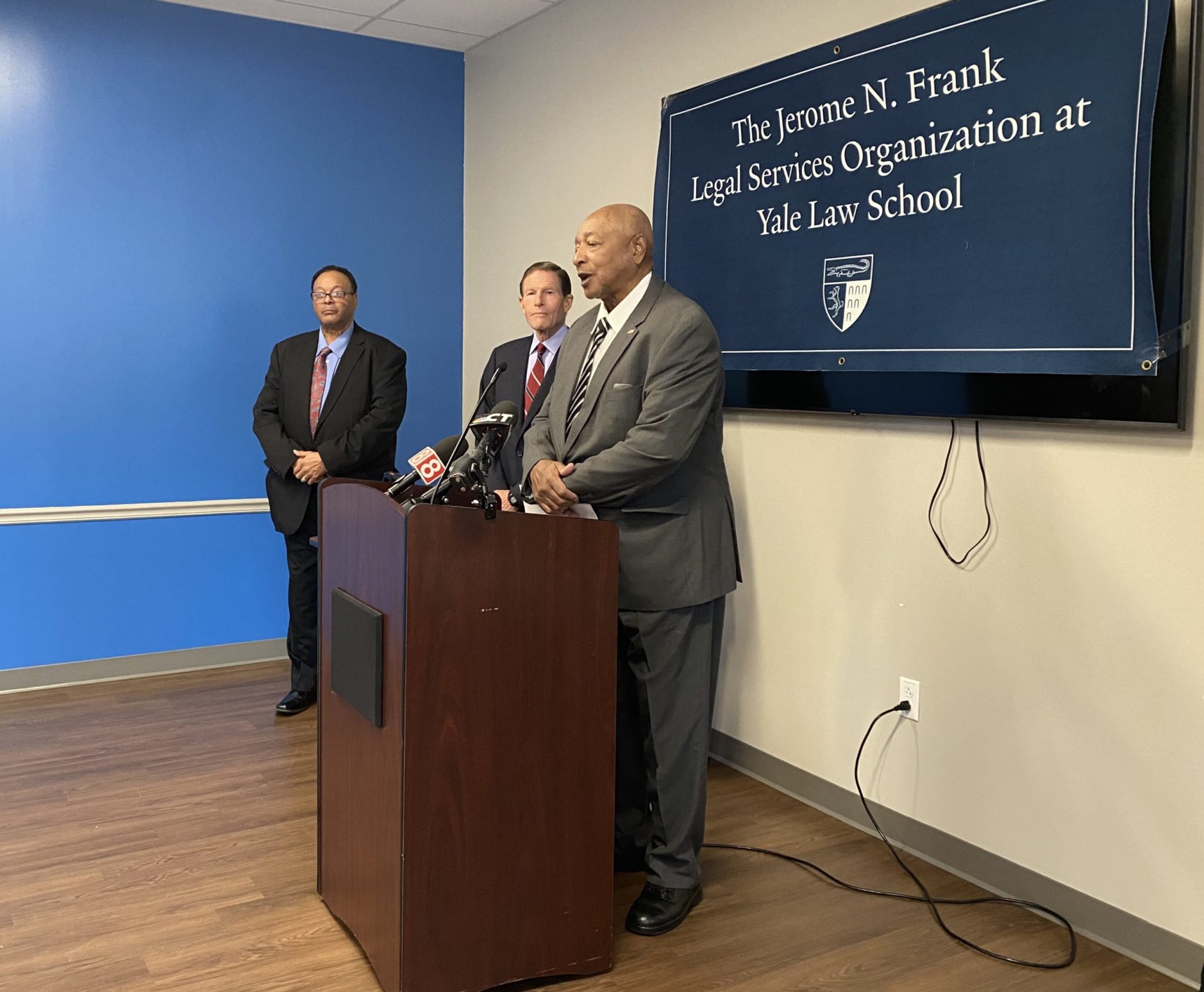Yale Law School clinic sues Department of Veterans Affairs over racial discrimination
The clinic is representing Conley Monk Jr., a Black marine and New Haven resident who was denied veterans’ benefits.

Sadie Bograd, Contributing Photographer
When Elm City resident Conley Monk Jr., returned from the Vietnam War, he expected to receive support from the Veterans’ Administration — now known as the Department of Veterans Affairs, or VA. Instead, he became one of the thousands of Black veterans to be denied benefits by the VA.
Monk announced that he is suing the VA for negligence at a press conference at the Dixwell Community Center on Oct. 28. The press conference included words by Monk’s legal representation — The Veterans Legal Services Clinic at Yale Law School, or VLSC — Senator Richard Blumenthal LAW ’73 and the nationwide nonprofit Black Veterans Project.
“Since our nation’s founding, our government has relied on Black Americans to win its wars,” said Richard Brookshire, the executive director of the Black Veterans Project. “Yet for decades, it has allowed racially discriminatory practices to obstruct Black veterans from equally accessing veterans’ housing, education and healthcare benefits.”
Monk is seeking compensatory damages for the VA’s negligence. He has separately submitted an administrative claim on behalf of his father, a World War II veteran who was also denied benefits.
The lawsuit alleges that racial bias in the military justice system made Black service members less likely to receive honorable discharges, which in turn affected their eligibility for VA benefits.
In 2021, the VA provided records of disability compensation claims in response to Freedom of Information Act requests from the National Veterans Council for Legal Redress, which Monk co-founded and directs and the Black Veterans Project. The records the VA disclosed reveal that there are statistically significant racial disparities in the outcomes of veterans’ benefit claims.
Between 2001 and 2020, for example, the VA on average denied 29.5 percent of Black veterans’ requests for disability compensation, compared to 24.2 percent of white veterans’ requests.
The lawsuit accuses the VA of negligence, stating that although the VA knew or should have known about these disparities, they did not address them. As evidence of this disparity’s widespread recognition, it points out that the Equal Employment Opportunity Commission prevents employers from requiring applicants to have honorable discharges because of pervasive discrimination in the discharge system.
“For decades, there have been anecdotal reports and widespread suspicion of racial discrimination in the VA benefits programs,” said Adam Henderson LAW ’23, an intern at the VLSC. “The VA has denied countless meritorious applications of Black veterans and thus deprived them and their families of the support that they are entitled to.”
Monk is one such veteran. After serving in Vietnam in 1969, Monk began to experience symptoms of post-traumatic stress disorder. He received an undesirable discharge, now known as a discharge “under other than honorable” conditions,” in 1970 after an altercation caused by his PTSD-induced hypervigilance.
When the VA conducted a Character of Discharge determination, they failed to consider the circumstances surrounding Monk’s discharge and declared him ineligible for education and housing benefits, leaving Monk temporarily homeless. The VA also denied Monk disability benefits for PTSD, and later for diabetes.
The department repeatedly declined to conduct a new Character of Discharge determination, even after Monk received a formal PTSD diagnosis. It was not until 2015, after an appeal in which Monk was represented by the VLSC, that Monk began to receive disability compensation, and only in 2020 did the VA recognize that Monk should have been eligible for benefits since his initial application for compensation in 1971.
Henderson described the two claims as evidence of “the generational harm that the VA has caused.”
The speakers expressed their hope that Conley’s lawsuit sets a precedent for other Black veterans to also seek out compensation.
“My lawsuit is also going to lead the charge for other veterans,” Monk said. “We are hoping and praying that we are successful in our fight because it’s not only for me and my father, it’s for thousands of other veterans that are undergoing the same type of situation.”
The lawsuit also alleges that even after Monk received some benefits, they were insufficient and did not address “the unique harm Mr. Monk suffered due to VA’s pattern of racial discrimination.”
Blumenthal said that regardless of whether the lawsuit is successful, it will call attention to the VA’s practices and encourage the department to reexamine the discharge and benefits system.
“At the very least, the VA and the Department of Defense are going to have to look at themselves in the mirror and say, ‘What is the reason for these disparate outcomes?’” Blumenthal said. “What we need to do is examine the whole system: the less than honorable discharge system, bad paper discharge, general discharge. These kinds of labels can stigmatize a veteran and stain his chances for success throughout life, not just with the VA, but throughout professional and personal life.”
Monk is suing under the Federal Tort Claims Act, which was enacted in 1946.







